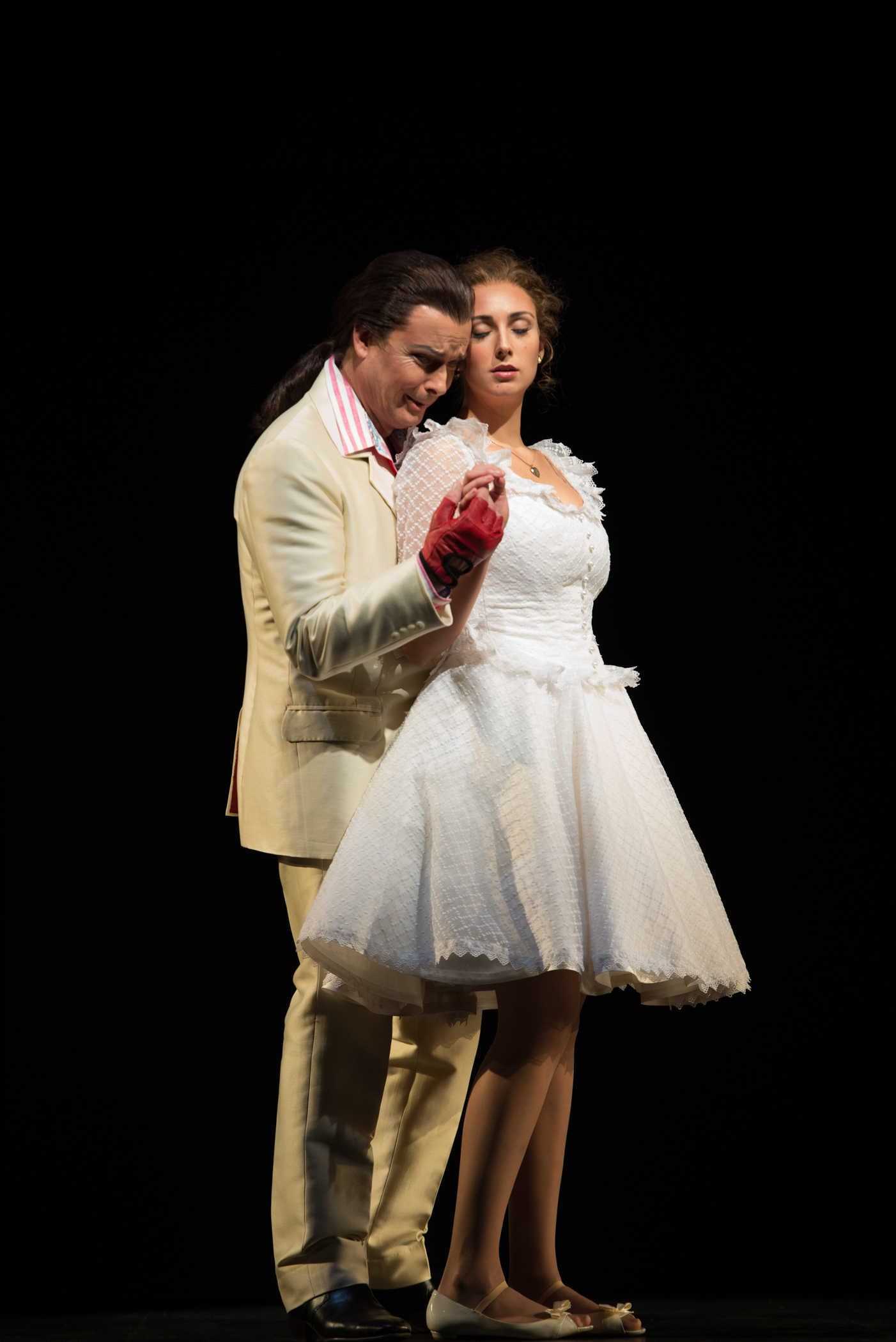These days, the sexual politics in Mozart’s Don Giovanni are nearly impossible to navigate. The zeitgeist can’t tolerate the glamorization of a serial seducer, so a likable Don is right out. Yet removing all redeeming qualities raises the question “So what does anyone see in him?” and makes the women in the opera seem masochistic, stupid, or both. From a feminist standpoint, it’s a lose/lose.
Another motive is that an edgier, “realer” Don Giovanni grabs an audience in a way that opera desperately covets, so recent versions I’ve seen have leaned the latter way: Kasper Holten’s 2011 film adaptation, Juan; Seattle Opera’s Young Artists Program production of the same year; and even Seattle Opera’s previous mainstage performance, from 2007, which starred Mariusz Kwiecień as a Don too obviously sociopathic to have any believable success with any non-lobotomized woman.
Probably the only way out of this dilemma is to double down on the comedy. Focusing less on the Don’s ad-campaign-friendly animal magnetism and more on the fact that, after all, none of his seductions come off as planned would help dilute (if not eliminate) the misogyny. (Yet another SO Young Artists production, from way back in the late ’90s, has stuck with me as a model Don Giovanni, precisely because it was funny all the way around.)
French bass Nicolas Cavallier as the title character in Seattle Opera’s production of Don Giovanni. Photo by Elise Bakketun
No one ever better grasped what makes this opera tick than critic Virgil Thomson, who wrote in a 1940 thinkpiece: “Mozart is kind to [his characters] and pokes fun at every one of them… It is all about love, and it kids love to a fare-ye-well. It is the world’s greatest opera and the world’s greatest parody of opera.” If everyone gets poked fun at, no one looks bad. Win/win.
Seattle Opera’s revival of its 2007 production, again directed by Chris Alexander, does move further in this direction—most apparent in Elizabeth Caballero’s flamboyant performance as Donna Elvira, the Don’s spurned lover. During the “Catalog Aria,” in which the valet Leporello shows off the contents of the Don’s not-so-little black book, she rips out a page, presumably hers; later she keeps a flask tucked in her bosom to swig liquid courage. Yet by the end she’s taken the full measure of one of the most richly layered of all soprano roles; her big Act 2 aria (rough translation: “I’ll kill the bastard, but I still pity him”) throbs with anger and deep feeling.
The plot’s launched by Don’s ravishment of another noblewoman, Donna Anna. Some productions question her innocence, implying there’s more consent in her close encounter with the Don than she lets on. Here Erin Wall plays the role completely straight, and thus less intriguingly, though she sings it vividly.
The third woman the opera throws in the Don’s path is Zerlina (Cecelia Hall), whom he pursues on her wedding day; when her fiance Masetto (Evan Boyer) blames her, she responds with these wince-making sentiments:
Beat me, dear Masetto,
beat your poor Zerlina.
I’ll stand here as meek as a lamb
and bear the blows you lay on me.
You can tear my hair out, put out my eyes,
yet your dear hands gladly I’ll kiss.
Ah! I see you’ve no mind to…
What is a Zerlina supposed to do with this? That last line makes it clear she’s playing this ironically, trying to embarrass Masetto out of his anger; I would love to see this irony exaggerated, played for comic effect rather than earnestly, which just leaves a bad taste.
In the title role, Nicolas Cavallier cuts a figure similar to Kwiecień’s in 2007—swooping around the stage in an open robe, hair slicked back into a ponytail—but it’s played lighter, less reptilian; he may even have smiled once. Cavallier’s voice is more wool than silk, which can be commanding, but which leaves both his Act 2 serenade and his breakneck “Champagne Aria” a little gruff and labored.
Erin Wall (Donna Anna) and Lawrence Brownlee (Don Ottavio) in Seattle Opera’s production of Don Giovanni. Photo by Elise Bakketun
Among the baritones, the most debonair voice, surprisingly, belongs to Erik Anstine as Leporello. Vocally, the most wondrous of all, as expected, is Lawrence Brownlee as Donna Anna’s fiance Don Ottavio, proving in his two arias why he’s one of today’s most sought-after lyric tenors.
Under Gary Thor Wedow—Seattle Opera’s go-to conductor for pre-1800 works—the Seattle Symphony has never sounded more period-instrument-y, lean and incisive; a few vibrato-free passages brought a new and striking string color. Robert Dahlstrom’s set, a looming gray wall riddled with doors and windows sliding open, expands the action vertically onto a second level at the expense of flattening it out from front to back and cramping it. (It seemed like a fresher concept in 2007.)
In director Alexander’s best bit of stage business, Leporello and the Don switch clothing so the former can distract Elvira while the latter chases her maid—a hoary device that’s hard to make plausible, but it worked beautifully here, and hinted at what the opera could have been if those comic chops had been applied more broadly. Don Giovanni McCaw Hall, 321 Mercer St. (Seattle Center), 389-7676, seattleopera.com. $25–$223. 7:30 p.m. Wed.–Sat. plus Fri., Oct. 31. Ends Nov. 1.
gborchert@seattleweekly.com







